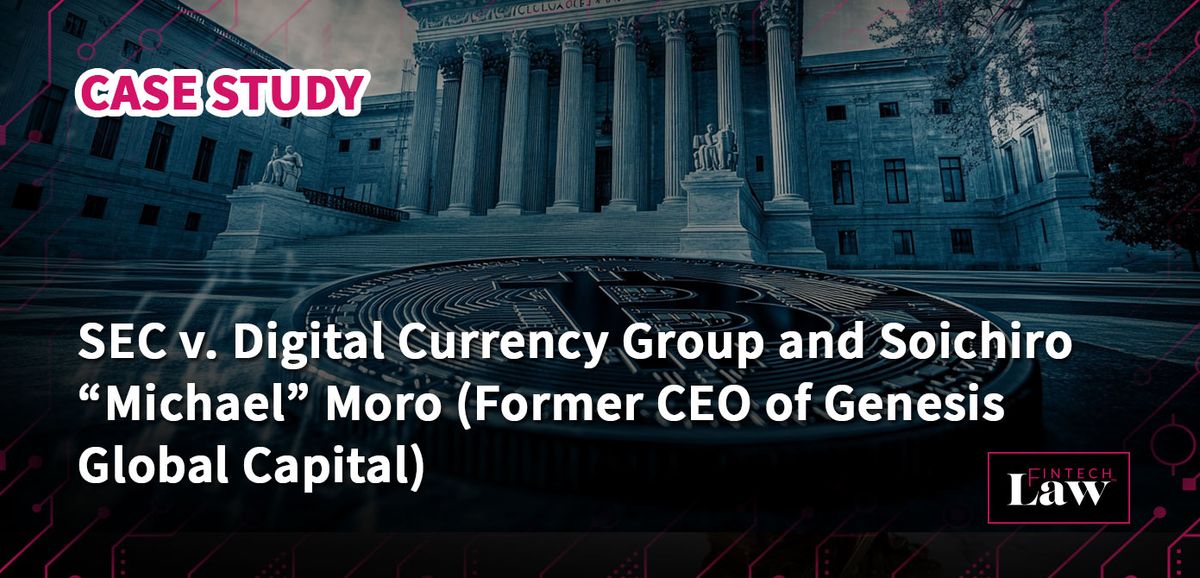SEC v Digital Currency Group and Soichiro “Michael” Moro (Former CEO of Genesis Global Capital)

Table of Content
Background
Legal Issues
Case Outcome
Broader Implications
Key Takeaways
References & Resources
Background
Industry Context
- Financial institutions and investment firms base their means of operation on a system of trust. Providing inaccurate or misleading information is considered a serious offence and the penalty thereof is quite severe.
Company Details
· Founded in 2015and incorporated in Delaware, the Digital Currency Group (DCG) has its principal place of business in Stanford, Connecticut. The companyis not registered with the Commission and has not registered any securities with the Commission either.
· Whilst working and residing in New York, Soichiro “Michael” Moro served as CEO of Genesis Global Capital (GGC) for the period June 2022 to July 2022, finally leaving in August 2022. He is not registered with the Commission nor has he registered any securities therewith. From 2004 until 2022, Soichiro “Michael” Moro was associated with a registered broker-dealer.
Key Events Leading to the Case
GGC operated as a crypto lending service for retail investors. Crypto assets and US dollars were lent to crypto-focusedhedge funds. Operating capital was derived from crypto assets tendered in return for interest payments.
During June 2022, Three Arrows Capital (TAC), one of the largest crypto asset hedge funds, defaulted on their payment, leaving GGC with only the collateral.With economic fluctuations, the “mark to market deficit” on the loan was $1 billion. All this left GGC with unsecured exposure.
Executive management made it clear to everyone that they needed to project strength.
On 15 June 2022 a tweet was circulated indicating that the balance sheet was strong.
On 30 June 2022 a $1.1 billion promissory note was issued. This note was recorded on the balance sheet as an asset, giving the company positive equity on the balance sheet.
On 6 July another tweet was circulated stating that DCG had assumed certain liabilities relating to TAC. This was false and misleading.
Legal Issues
Allegations/Claims/Violations
After comprehensive investigation into matters against each Respondent individually as well as both combined, they were found guilty as follows:
Soichiro “Michael” Moro
- Violation of Section 17(a)(3) of the Securities Act of 1933:
- “…to engage in any transaction, practice or course of business which operates or would operate as a fraud or deceit upon the purchaser”.
- Based on Section 14(e) of the Securities Exchange Act of 1934, only a showing of negligence and not a showing of scienter is required.[Aaron v SEC, 446 U.S. 680, 696-97 (1980)]
- Maintaining the depiction of the strong financial position of Genesis after the TAC default.
- Falsely and misleadingly issuing a promissory note as a solution to the default problem.
- Negligently engaging in the creation of misleading or false impressions regarding Genesis's financial position.
Digital Currency Group (DCG)
- Violation of Section 17(a)(3) of the Securities Act of 1933:
- “…to engage in any transaction, practice or course of business which operates or would operate as a fraud or deceit upon the purchaser”.
- Based on Section 14(e) of the Securities Exchange Act of 1934, only a showing of negligence and not a showing of scienter is required.[Aaron v SEC, 446 U.S. 680, 696-97 (1980)]
- Maintaining the depiction of the strongfinancial position of GGC after the TAC default.
- Not ensuring that the promissory note was accurately described.
- Negligently engaging in materially false messaging regarding the financial condition of GGC.
Case Outcome
Verdict/Settlement
Verdicts in the case were issued as follows:
In the matter against Soichiro “Michael” Moro:
- A cease and desist order was issued.
- A financial penalty to the value of $500 000, to be paid as follows:
- ACH or Fedwire transfer
- Direct payment
- Certified check
- Bank cashier's check
- Postal money order
In the matter against Digital Currency Group Inc:
- A cease and desist order was issued.
- A civil penalty in the amount of $38 000 000.00, to be paid as follows:
- ACH or Fedwire transfer
- Direct payment
- Certified check
- Bank cashier's check
- Postal money order
Broader Implications
For the Fintech Industry
The judgement in this matter has shed light on the severity of misleading conduct within the FinTech industry. It stands as a stark warning to other FinTech companies to guard against the same business practices that could lead to punishment by the SEC.
Regulatory Trends
On the regulatory side, the value of strong corporate governance has been established. If these measures had been in place, independent verification would have been able to identify issues and establish measures to remedy the situation, without its having escalated.
Key Takeaways
Lessons Learned
- Integrity and trust are the foundations upon which any financial institution should base its business model.
- Conformity to regulatory bodies helps guide the conduct of any and all financial institutions and employees.
- Companies and individuals need to bear the consequences of any misconduct, whether it be a criminal conviction or just a financial penalty.
References & Resources
- SEC Press Release: SEC.gov | SEC Charges Digital Currency Group and Soichiro “Michael” Moro, Former CEO of Genesis Global Capital, for Misleading Investors about Genesis's Financial Condition.
- Direct Case Link: www.sec.gov/files/litigation/admin/2025/33-11357.pdf.
- https: //www.sec.gov/files/litigation/admin/2025/33-11358.pdf.
- SEC targets DCG and Genesis executives for fraud over 3AC fallout.
Book Consultation
Need help understanding how to ensure compliance and transparency in your Fintech company?
Contact us today for a consultation.
